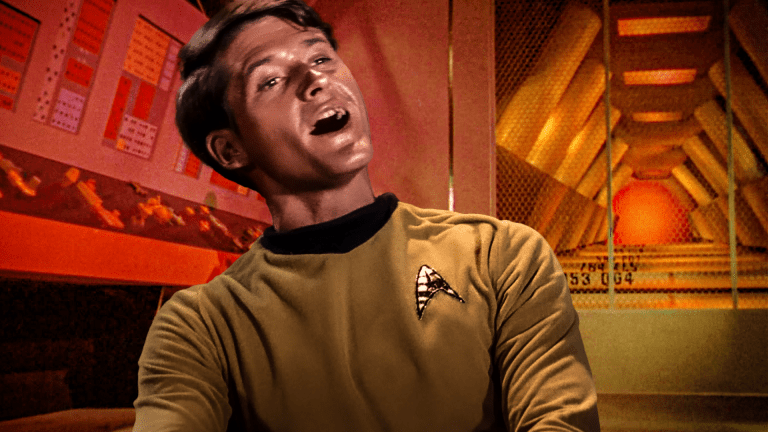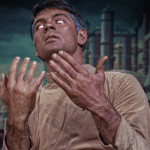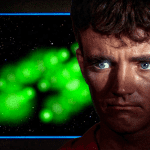“The Naked Time”
Original airdate: 29th September 1966
Written by: John D.F. Black
Directed by: Marc Daniels

In a nutshell: Memorable, but not for all the right reasons. Just because it’s “classic” doesn’t automatically make it good.
“And now, crew, I will render Kathleen. One more time!”
“Please, not again.”
In the decaying orbit of Psi 2000, an icy world on the brink of destruction, the crew of the Enterprise are stricken by an intoxicating virus that causes them to lose their inhibitions. With most of the ship succumbing to wild impulse, the remaining uninfected crew race to save the ship as the planet below begins to disintegrate.
“The Naked Time” is notable for several reasons. Among the many in-universe tweaks or additions, it’s the episode that (properly) introduces the ship’s Chief Engineer Montgomery “Scotty” Scott (James Doohan), a fan-favourite character who makes an instant impact with some of the show’s best lines. It also delivers the game-changing revelation that Spock (Leonard Nimoy) is not only half human (on his mother’s side), but that Vulcans are actually capable of emotion, they just choose to suppress them.
It’s an important episode that continues to optimise and enhance the Star Trek universe, the series slowly but surely evolving into its final form with each passing week. But despite its canonical significance, it’s just not a very good episode. It has a strong concept: the viral outbreak, yet another soon-to-be Trek trope forever recycled across the franchise. But its messy execution leaves much to be desired.
The episode starts with Spock and crewman Tormolen (Stewart Moss) beaming down to a research outpost on planet Psi 2000. They discover a frozen laboratory filled with bodies of research scientists who have seemingly died in a series of bizarre incidents. In a moment of incredible carelessness, Tormolen removes a glove, exposing himself to a strange liquid-like substance, unknowingly infected with the chaos-causing virus. It’s a strong, albeit silly opening with some striking imagery. I’ve always enjoyed the establishing shot with Marc Daniels’ direction combining with Alexander Courage’s score to create an eerie visual filled with intrigue.
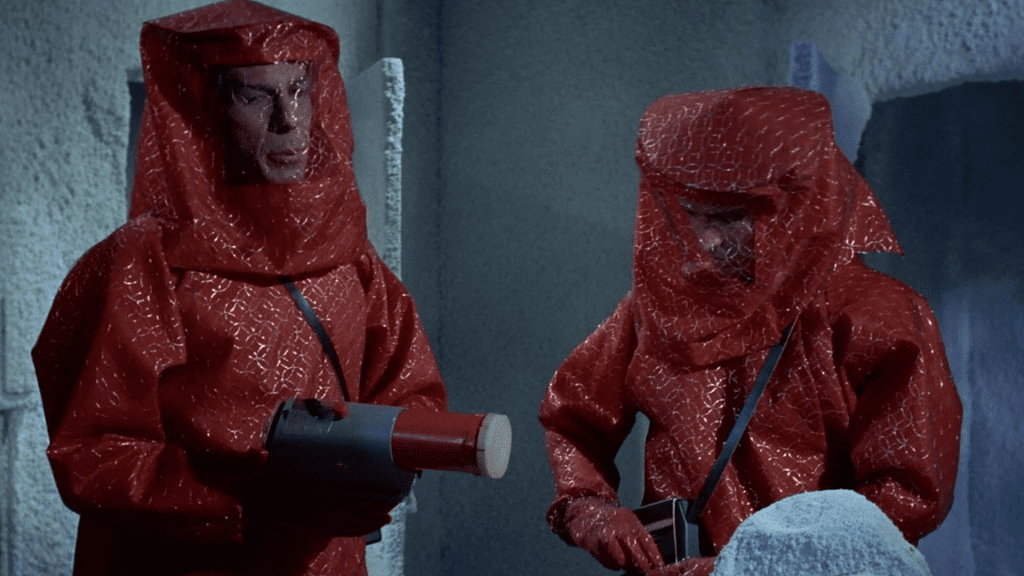

Back on Enterprise Tormolen begins to exhibit usual behaviour, suddenly becoming distressed, openly questioning mankind’s place amongst the stars before getting into a violent (and ultimately fatal) altercation with his crewmates. Tormolen’s existential dread might be my favourite idea raised over the hour. It’s a good question for the more pessimistic viewer: what right do humans have to explore deep space? It’s a fleeting thought that unfortunately dies with Tormolen a few moments later. Unless I’m mistaken I don’t think it’s an idea that any series has floated since. Good value material that might be worth re-exploring at some point.
From here on “The Naked Time” mutates into disappointment. The virus spreads, wreaking havoc among the ship’s 400-plus crew. The situation worsens when an infected Lieutenant Riley (Bruce Hyde) wrests control of engineering (how he manages this is never explained) from Scotty and turns the engines off, putting the ship in imminent danger with the planet minutes away from destruction. It all sounds quite dramatic, but it’s hard to feel a true sense of scope when the ship feels so empty, with most of the carnage unfolding off-screen.
What madness we do see depicted is pretty tame, doing little to push the severity of the situation. Sulu’s “musketeer” scenes are memorable, sure – particularly his foray onto the bridge where he becomes the first victim of Spock’s iconic nerve pinch. Riley, the ship’s self-appointed new Captain, is more of an unfunny, childish irritant than anything else. And much like Kirk I never want to hear that song again.
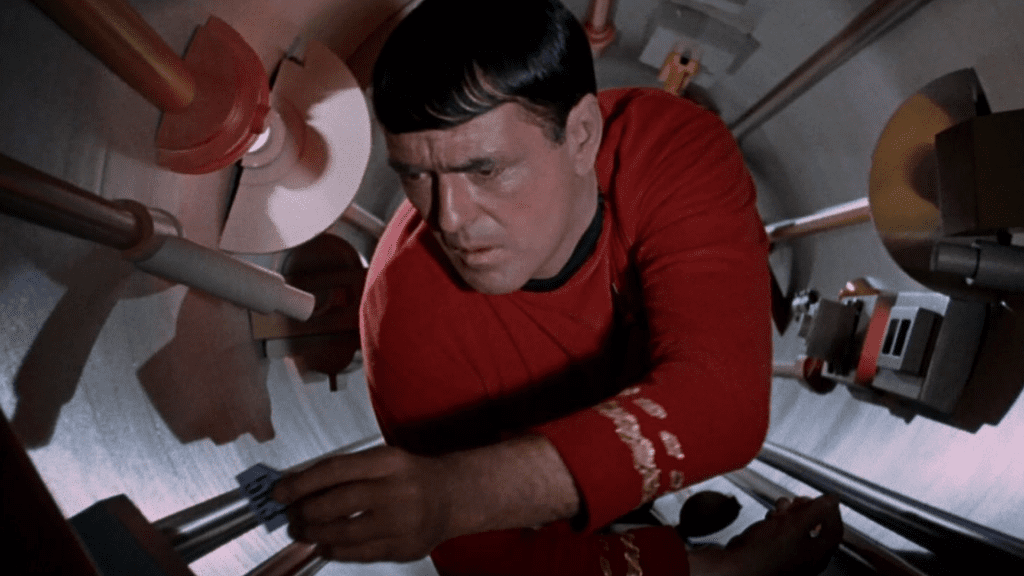

It’s a prime example of the dangers of breaking the “show, don’t tell” rule. So much happens through exposition – McCoy’s development and identification of an eventual cure occurs almost entirely off-screen – it’s hard to properly follow and, worse, very difficult to care about.
But the character development, the ultimate aim of the episode, is mostly effective. Spock’s eventual infection and breakdown is melodramatic but adds unexpected layers of complexity. It also works as a powerful showcase of Nimoy’s considerable acting range. The knowledge that this outwardly cold Vulcan is actually working to keep a lid on his passions makes him an infinitely more interesting character. It’s a crucial development that many female viewers thirstily picked up on, and a major reason for his eventual emergence as (arguably) the show’s most popular character.
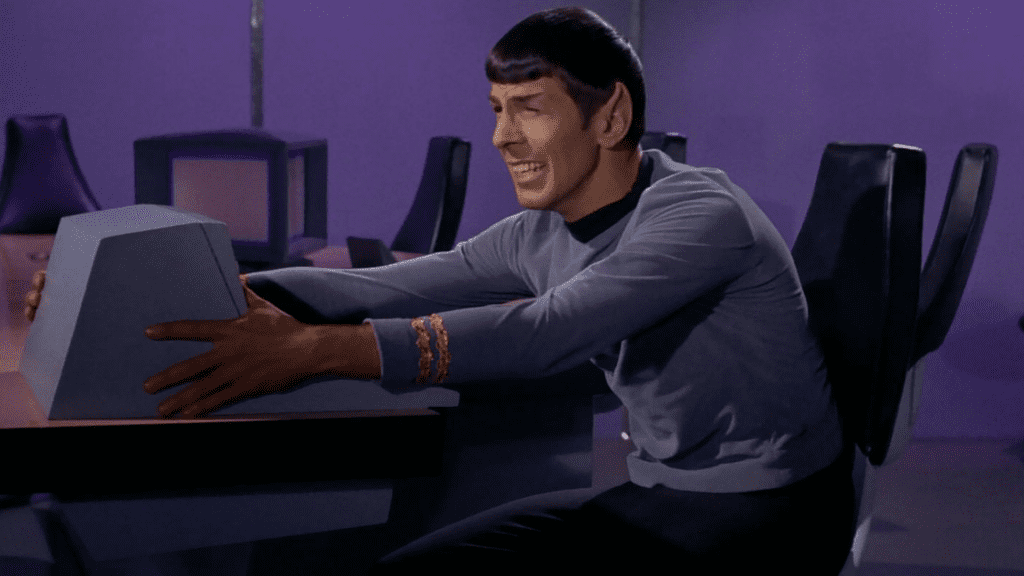

Not one to be outshone, William Shatner also gets a moment to flex his acting muscles. Kirk’s explosive confession, symptomatic of the virus’ ability to lower inhibitions, isn’t as revelatory, but it does reinforce the character as a man of extreme dedication to his duty. More interesting is Kirk’s remarkable ability to cure Spock with a couple of face slaps and a rant about having a crush on his Yeoman. It’s an unintentionally humorous moment that showcases just how messy this episode is.
The show’s ending features quite possibly the most “out there” resolution in Trek history. Kirk somehow pulls himself together and heads to the bridge for a hilariously unnecessary Kirk Shirt Tear™️. The ship then successfully breaks the laws of physics (sorry Scotty), escaping orbit just as the planet finally breaks apart. Not only do they escape certain death, but they also invent time travel. It’s a wild finale, a deus-ex-machina more sci-fantasy than fiction that clunkily attempts to add a new chronometric feature to the series. It’s almost admirable.
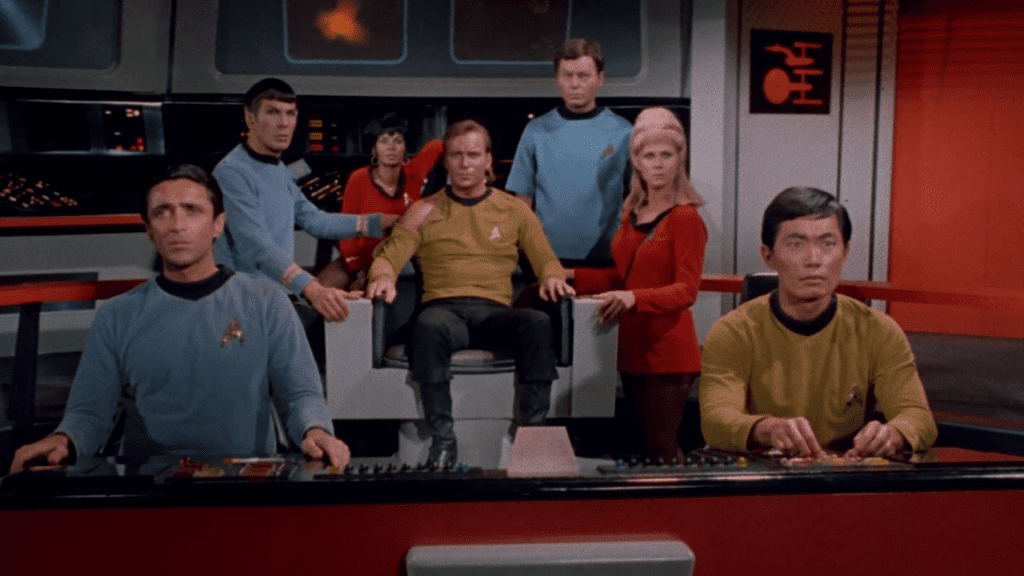

I’m perfectly comfortable being in the minority here. “The Naked Time” has plenty to love, but for me only as one of Trek’s “so bad it’s good” offerings. It’s a fan-favourite show that enriches the universe and its characters, but whenever I watch it all I seem to notice are its lesser aspects: sloppy storytelling that struggles dramatically, filled with inconsistency and convenience. It’s an episode that fails to live up to the potential of its premise. Maybe that’s another reason Gene revisited the same concept a couple of decades later.

